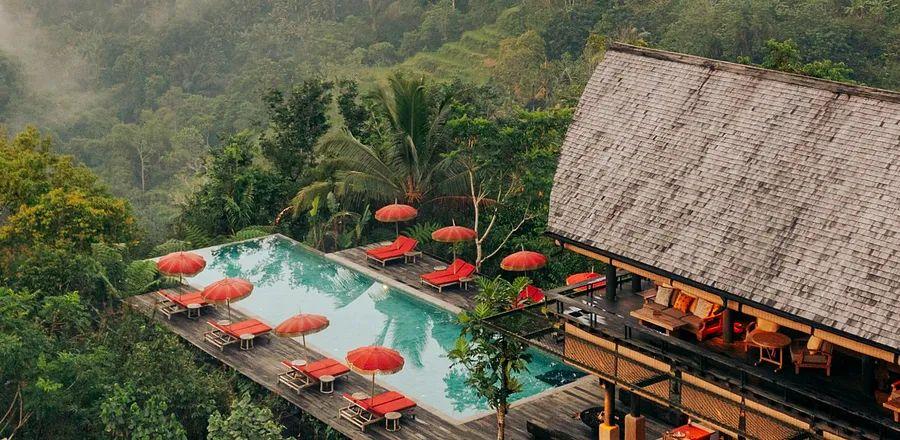Discover Bali’s Most Breathtaking—and Eco-Conscious—Hotels

Bali, the Indonesian island known for its vibrant temples, lush jungles, and beautiful beaches, has been my home on and off for five years. This paradise is famous for its cultural richness and stunning landscapes, but it also faces a waste crisis. I’ve witnessed subak rice irrigation channels choked with plastic waste and have encountered debris while surfing. Contributing factors include the absence of a centralized waste management system, excessive tourism leading to single-use plastic consumption, and lax litter enforcement.
Since 2019, the Balinese government has enacted several bans on single-use plastics, though compliance has been lacking. In response, numerous eco-conscious local organizations and businesses have launched grassroots initiatives. For example, NGO Plastic Exchange offers rice in exchange for recyclable plastic waste to support local families, while Sungai Watch coordinates clean-up efforts along rivers and coastlines. (It estimates that only 4 percent of plastics in Bali are recycled.) Several boutique hotels have also joined this movement, developing waste-reduction strategies and finding innovative ways to repurpose trash and plastic, aiming to remedy years of environmental neglect while providing guests with engaging experiences that promote awareness.
“Our perspective on waste and disposal has shifted dramatically,” said Silvina Miguel, a regenerative tourism consultant and permaculture designer, during our recent meeting at Alila Villas Uluwatu, one of her clients. “We are now embracing a circular economy. Creativity is essential. Every waste item can lead to collaboration, new opportunities, and unique products—each one tells its own story.”
I stayed at these three Bali resorts to explore how they are transforming waste reduction and recycling into an artistic journey.

Image courtesy of Desa Potato Head
Desa Potato Head
Nestled in the bustling Petitenget area of Seminyak on Bali's western coast, Desa Potato Head features two hotels and several restaurants. It started in 2010 with the launch of the iconic Potato Head Beach Club, known for its impressive lineup of DJs, set behind a stunning mosaic of 6,600 recycled wooden shutters. Indonesian architect Andra Matin designed both the venue and the Potato Head Suites, which debuted as Katamama in 2016. This establishment boasts 58 suites adorned with midcentury-inspired furniture crafted in Indonesia and locally woven textiles, all housed in a building made of 1.8 million hand-pressed terra-cotta bricks. The 168-room Potato Head Studios, a beachfront property designed by Rem Koolhaas’s OMA, opened in 2021 and showcases contemporary furnishings made from recycled materials by British designer Faye Toogood and Catalan designer Andreu Carulla. The pink facade is created using powder from salvaged broken bricks.
In 2017, while surfing with his son amid floating debris, Potato Head founder Ronald Akili realized the urgent need for change. This moment inspired the mantra “good times, do good,” along with a partnership with Balinese environmental engineering firm Eco Mantra, which discovered that 50 percent of the beach club's waste was ending up in landfills. As of January 2023, an audit by Eco Mantra revealed that Potato Head has reduced this to just 2.6 percent, with a goal of achieving zero waste in the coming years.

Image courtesy of Desa Potato Head
What to anticipate
Eco-conscious travelers will adore Desa Potato Head’s Womb, a nearly 300-foot-long skylit bamboo tunnel crafted by Balinese artist Nano Uhero. This space houses the Waste Lab, a unique blend of museum and upcycling research hub dedicated to zero waste solutions in hospitality. Inside, vibrant blue machinery produces terrazzo-like panels from colorful plastic waste collected by Sungai Watch from Bali’s rivers. These plastic sheets are transformed into stylish design pieces and furniture, including a minimalist chair by British designer Max Lamb. Guests can participate in workshops to create candles from used cooking oil, tote bags dyed with indigo from retired bedsheets, and tie-dye bracelets made with recycled plastic beads. The experience is accompanied by Indonesian music from Headstream, a DJ booth made from 1,243 pounds of recycled plastic, including motor oil bottles and mineral water caps.
The resort’s daily Follow the Waste tour highlights its on-site regenerative initiatives. During the tour, I learned that the hotel provides workshops for nearby properties on improving waste sorting and recycling practices, and plans to establish a community waste facility later this year. An upcoming rake-like device will allow guests to incorporate trash collection into their beach workouts. Additionally, on-site art installations use waste creatively: December 2022 marked the debut of graffiti artist Futura2000’s 20-foot-tall Pointman—River Warrior sculpture, constructed from litter found in Bali. This towering blue figure serves as a poignant reminder of the ongoing waste crisis.
At Tanaman, the resort's restaurant that sources all its ingredients from Indonesia, I savored a delightful seven-course plant-based meal. Meanwhile, Ijen, the seafood restaurant where tables are crafted from the Waste Lab’s terrazzo-like plastic panels, utilizes every part of sustainably caught fish, including barramundi and mahi-mahi from Indonesian waters. Fish bones are transformed into bouillon, while scales are dehydrated, fried, and blended into togarashi. Abundant oyster shells are crushed and mixed with Styrofoam (from the hotel’s TV packaging) and limestone powder to create bubblegum-colored amenity kits for the studios.

Photo by Kathryn Romeyn
Alila Villas Uluwatu
Alila Villas Uluwatu is a paradise for ocean enthusiasts: Its 65 pool villas are perched on limestone cliffs overlooking the iconic waves of southern Bali. Here, you can sip an aquamarine seaweed-infused gin cocktail at a bar that extends over the Indian Ocean. The EarthCheck-certified resort boasts a stylish design by Singapore-based architecture firm WOHA, which exclusively used Indonesian materials to minimize its environmental impact. Lava rocks from Bali’s Mount Batur top flat, bamboo-lined roofs to help regulate heat and reduce electricity consumption, while the 36-acre property has reintroduced native plants, such as gamal trees (whose roots are used for sculpture), aiming for self-sufficiency.
What to anticipate
One morning, I joined regenerative tourism consultant Silvina Miguel for a behind-the-scenes tour of the Sustainability Lab, a collection of repurposed shipping containers and outdoor areas that manage all resort waste and excess materials. This is where Alila bottles its own drinking water from a deep well using a reverse osmosis system and processes its waste. Miguel offers complimentary tours for guests every Tuesday, Wednesday, and Thursday afternoon. Visitors can also book a paid Journey to Sustainability experience, which includes the tour, a sambal-making class in the organic garden, and a traditional family-style Indonesian lunch with her at the Warung, an open-air restaurant focused on local cuisine.
I’ve participated in sustainability tours at other hotels before, but I’ve never encountered an on-site recycling initiative as thorough and meticulous as this one. During our tour of the lab, I observed a highly organized waste sorting system, complete with dedicated bins for slippers, coffee capsules, and used bamboo toothbrushes. The toothbrushes are sterilized, chopped, and repurposed to fill beanbag chairs in staff areas. Toilet paper rolls are sent to the R.O.L.E. Foundation’s skill center in Nusa Dua to be converted into recycled paper. Wine bottles are easily transformed into glassware. Old golf cart tires find new life as playground equipment near the Sustainability Lab and as planters, while others are sent to local footwear brand Indosole to be made into sandals. The resort also donates broken umbrella fabric to a community in Tabanan for use in tote bags. Learning about these initiatives made me feel less guilty about indulging in the culinary offerings, crafting floral canang sari offerings, and enjoying a Balinese massage at the spa.

Image courtesy of Alila Villas Uluwatu
One evening at sunset, while relaxing on a daybed with a cocktail at the Sunset Cabana Bar, I began a conversation with Putu Wirawan, the head bartender. He shared that my Tanqueray dry gin cocktail was crafted with foraged seaweed and butterfly pea flowers from the resort’s organic garden, and the Balinese sea salt came from local villagers in Kusamba. Any leftover ingredients from the bar are either sent to a local pig farm or distilled on-site to create an artisanal arak-based spirit known as Alila Botanicals, now offered as a complimentary in-villa amenity. It felt like a true celebration of these ocean-sourced ingredients.
Buahan, A Banyan Tree Escape
Perched 2,000 feet above sea level in the jungle-drenched landscapes 40 minutes north of Ubud, Buahan, a Banyan Tree Escape opened its doors in the summer of 2022 across 12 acres. This eco-conscious resort features 16 villas that have no walls or doors—only opaque curtains and generous spacing between accommodations to ensure privacy. This design enhances the connection with the surrounding natural beauty, reflected in the swirling patterns on the villas’ terra-cotta walls and the handmade bathrobes.
Twenty years ago, Singapore-based luxury hotel group Banyan Tree acquired this off-the-beaten-path property and later enlisted architect Gede Kresna from the local firm Rumah Intaran. Kresna sent several team members to reside in the village of Buahan for three months, immersing themselves in its daily life, traditions, and landscape. Their goal was to capture the village's essence for luxury hotel guests while also fostering community support through local employment and sourcing materials and ingredients from nearby businesses.
What to anticipate
One morning, I joined chef I Wayan Eka Sunarya from Buahan at a hilltop. "We can make something out of everything, so nothing goes to waste," he smiled. The kitchen scraps transform into umami powder, enhancing dishes without the need for MSG. Offcuts from fruits and vegetables are turned into various kombuchas, while fish remnants become a powder that substitutes shrimp paste in the traditional breakfast dish lontong sayur. I experienced the process firsthand during a cooking class where we prepared pork satay, moringa soup, and grilled gourami fish with torch ginger, all while enjoying the view of lush, misty landscapes.
At the resort’s Open Kitchen and Botanist Bar, which uses over 350 pounds of produce monthly, Sunarya manages to source 90% of the ingredients from within 43 miles of the resort. This includes seafood from Kedonganan market and free-range ducks from a local farmer. An on-site organic garden nurtures over 70 types of vegetables and herbs, while a nearby community farm provides unique ingredients like coconut stem mushrooms and overly ripe bananas, which Sunarya transforms into delicious desserts like kolak pisang. The kitchen is almost completely free of plastic.
Later, I spoke with organic farming expert I Wayan Wardika about the Balinese Hindu principle of Tri Hita Karana, meaning "harmony with god, people, and nature." He embodies this philosophy in everything he does, including managing a firefly breeding nursery in Buahan’s rice terraces, which opened in March 2023. This nursery replicates the insects’ natural environment to safeguard their delicate breeding cycle. Supported by Jimbaran’s University of Udayana, Wardika sees these fireflies as indicators of a healthy ecosystem. He believes that if action isn't taken now, future generations might only hear stories of fireflies.

1

2

3

4

5
Evaluation :
5/5